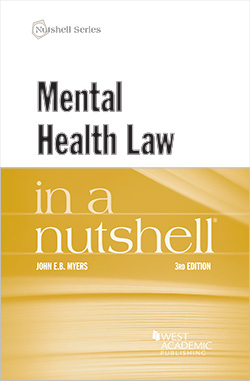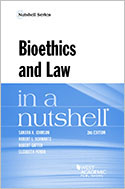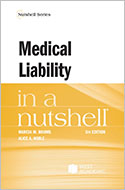
Mental Health Law in a Nutshell
Author:
Myers, John E.B.
Edition:
3rd
Copyright Date:
2022
15 chapters
have results for Mental Health Law in a Nutshell
Chapter 1 Introduction 122 results (showing 5 best matches)
- Most Nutshell readers are law students or lawyers who have relatively little training in psychology, apart from a course or two in college. For that reason, Chapter 1 begins with an introduction to the mental health professions and mental health diagnosis and practice.
- What is mental health law? The answer is: Many things to many people. This Nutshell covers a broad range of subjects at the interface of law, psychology, clinical social work, psychiatry, and medicine. Subjects include the insanity defense, the Americans with Disabilities Act, involuntary psychiatric hospitalization, Social Security disability, and much more.
- In addition to philosophical differences, the methods of mental health professionals and lawyers differ. Mental health outcomes are achieved in the highly confidential setting of individual and group therapy. When appropriate, clients are prescribed medications to help with psychological symptoms. In law, outcomes are achieved through investigation, negotiation, compromise, mediation, arbitration, settlement, and, when necessary, litigation.
- Social workers work in many settings including child protection, hospitals, jails, schools, welfare agencies, and in mental health. Licensed clinical social workers (LCSW) earn a master’s degree in social work (MSW) or a doctorate (Ph.D. or D.S.W.), and provide psychotherapy, counseling, and other services for clients in hospitals, mental health clinics, and in private office practice.
- In mental health practice, an important part of the diagnostic process is the mental status examination. The professional asks questions to learn of the patient’s current mental state and functioning. A helpful description of the mental status examination is found on the Social Security Administration’s website that lists criteria to evaluate disabilities based on mental disorder. The website states:
- Open Chapter
Chapter 5 Civil Matters 103 results (showing 5 best matches)
- Divorce and child custody proceedings are extremely stressful. Many parents turn to mental health professionals for help. Often, children benefit from counseling. Chapter 1, discusses the distinction between forensic mental health practice and clinical practice. Providing therapy to parents, couples, and children involved in family law proceedings is clinical practice. The Association of Family and Conciliation Courts provides useful guidance for mental health professionals treating clients embroiled in family law proceedings:
- Is there a legally enforceable right to mental health treatment? Michael Perlin observes that “there was virtually no mention of the idea of a ‘right to treatment’ in any of the legal literature written prior to 1960.” (Michael Perlin,
- Law allows for emergency short term ( , 72 hour) hospitalization of persons who appear to be seriously mentally ill and who pose an immediate threat to themselves or others. ( ). Typically, these laws allow a police officer to take the person to a hospital. Some states require the officer to consult a mental health professional before hospitalizing the patient. Other states allow an officer to act alone. In addition to police, many states allow physicians and mental health professionals to initiate emergency hospitalization. Usually, a judge is not involved at this stage.
- Although the exact wording of civil commitment laws varies from state to state, there is a high degree of uniformity in the legal standard for civil commitment. The government must prove: (1) The individual is mentally ill; (2) As a result of mental illness the individual poses an immediate threat of substantial harm to the individual or others; and (3) There is no less restrictive alternative to hospitalization that can address the individual’s mental health issues.
- Family Law in a Nutshell
- Open Chapter
Chapter 6 Civil Liability of Mental Health Professionals 81 results (showing 5 best matches)
- What should the outcome be when a “regular” medical doctor “provides incidental mental health treatment to a patient”? ( 52 A.3d at 1253). The Pennsylvania Supreme Court ruled that on the facts in a doctor would not be held to the standard required of mental health professionals.
- Arizona’s law states, “There shall be no cause of action against a mental health provider nor shall legal liability be imposed for breaching a duty to prevent harm to a person caused by a patient, unless both of the following occur: (1) The patient has communicated to the mental health provider an explicit threat of imminent serious physical harm or death to a clearly identified or identifiable victim or victims, and the patient has the apparent intent and ability to carry out such threat. (2) The mental health
- While virtually all jurisdictions have acknowledged some form of the duty to warn, various jurisdictions have nevertheless strenuously disagreed whether mental health treatment providers can testify about threatening statements made by their patients when these statements have been disclosed pursuant to the duty to warn. For example, in , the Sixth Circuit Court of Appeals held that even if a mental health treatment provider warns potential victims and law enforcement about a patient’s threatening statements, the provider is still barred from testifying about these statements in court. In contrast, in , the Fifth Circuit Court of Appeals held that the testimonial privilege does not bar mental health treatment providers
- Mental health professionals can be sued for improperly disclosing confidential and/or privileged records. ( the Discussion of HIPAA in Chapter 2). In
- The Pennsylvania Supreme Court addressed an important aspect of sexual relations with clients in
- Open Chapter
Chapter 4 Criminal Law 160 results (showing 5 best matches)
- Chapter 4 discusses the role of mental illness and mental health professionals in criminal law. Not a day goes by that police, prosecutors, defense attorneys, probation and parole officers, jail and prison authorities, and judges do not interact with individuals suffering mental illness, addiction, and intellectual disability. It is a sad commentary that America’s jails and prisons are home to hundreds of thousands of mentally ill inmates. Indeed, there are more mentally ill people in jail than in the hospital.
- When arrest occurs, prosecutors consider mental illness in deciding what, if any, charges to bring. Some cities have a mental health court. Other cities have drug court, veteran’s court, or other specialized courts.
- A psychological evaluation regarding insanity should be comprehensive. In addition to interviewing the defendant, the mental health professional contacts collateral sources to shed light on the defendant’s mental condition at the time of the offense.
- American jails and prisons have medical and mental health professionals on staff. Needless to say, the quality of mental health care varies from
- Diminished capacity often overlaps with the impact of mental illness on mens rea, discussed above. John Parry observes, “Diminished capacity is found in relatively few jurisdictions and in most instances is not really diminished capacity, but rather the lack of mens rea disguised as diminished capacity. At least 18 states, which claim to have a diminished capacity defense actually are referring to the lack of specific intent with regard to an element of the crime, which is more properly called lack of mens rea.” (John Parry,
- Open Chapter
Chapter 2 Confidentiality 97 results (showing 5 best matches)
- When it comes to adolescents, things get tricky. In a legal sense, a teenager is still a “child.” Thus, parents can talk to professionals treating the “child.” At the same time, state laws allow teenagers to consent to certain medical and mental health care, without parental involvement. When these laws apply, HIPAA specifies that parents do not have the right to a teenager’s medical information (
- The HIPAA Privacy Rule protects the confidentiality of health and mental health information. The Rule is broad, protecting all “individually identifiable health information.” HIPAA applies to most health and mental health professionals in the United States. Professionals and entities covered by HIPAA are called “covered entities.” The Privacy Rule requires covered professionals to ensure the confidentiality, integrity, and availability of all electronic health information. In addition, professionals must take reasonable steps to protect against threats to the security of electronically stored health information (
- MENTAL HEALTH AND MEDICAL PROFESSIONALS TESTIFYING IN COURT
- Mental health professionals should consult an attorney about reviewing confidential and privileged records in preparation for testimony, and about taking records to court.
- The law in many states provides that the defendant cannot be the one to trigger the patient-litigant exception by putting the plaintiff’s mental or physical condition in issue. The initiative must come from the plaintiff. In , for example, the court wrote, “A plaintiff does not put his mental state in issue merely by acknowledging he suffers from depression, for which he is not seeking recompense; nor may a defendant overcome the privilege by putting the plaintiff’s mental state in issue.” At the same time, when a party’s mental or physical condition is central to the outcome of a case, the law generally allows judges to balance the need for relevant information against the harm caused by disclosure of confidential information. (
- Open Chapter
Chapter 3 Expert Testimony 59 results (showing 5 best matches)
- Expert testimony from mental health and medical professionals plays a vitally important role in litigation regarding mental illness and intellectual disability. This chapter outlines the rules of evidence governing expert testimony.
- specifies that experts may base opinions on information that is not admissible in evidence so long as other experts in that field rely on such information. In the mental health field, experts routinely rely on hearsay that might or might not be admissible in court. Written hearsay includes clinical records, test results, and documents prepared by police and social services agencies. Verbal hearsay includes the patient’s “history.” A mental health professional acts properly when the professional bases expert testimony on such hearsay.
- Not only does reasonable certainty have no clear meaning, the phrase can cause confusion because it is a legal term, not a term employed in medicine or mental health. Glenn Bradford comments, “Many lawyers and judges believe the phrase is a medical term of art. Physician commentators, however, have described the phrase as a legal term of art.” (Glenn F. Bradford, Dissecting Missouri’s Requirement of “Reasonable Medical Certainty,” 57
- Expert witnesses base their opinions on a broad range of facts and data. In the mental health arena, experts rely on many sources of information, including interviews of the individual, discussions with others, consultation with other experts, psychological tests, and written documentation, including hospital records and police reports. The rules of evidence permit experts to formulate court testimony based on the types of facts and data experts rely on in their normal, day-to-day work outside the courtroom.
- has a direct bearing on expert testimony from mental health professionals. The Rule prohibits an expert from offering an opinion that a defendant did or did not have the mens rea required for a crime. Nor may an expert testify that a defendant met the requirements of the insanity defense. The Advisory Committee Note to
- Open Chapter
Outline 29 results (showing 5 best matches)
Copyright Page 5 results
- Nutshell Series, In a Nutshell
- The publisher is not engaged in rendering legal or other professional advice, and this publication is not a substitute for the advice of an attorney. If you require legal or other expert advice, you should seek the services of a competent attorney or other professional.
- Printed in the United States of America
- © 2016, 2019 LEG, Inc. d/b/a West Academic
- © 2022 LEG, Inc. d/b/a West Academic
- Open Chapter
Title Page 3 results
Chapter 8 Financial and Medical Benefits for Disabled Persons 17 results (showing 5 best matches)
- It was once common for insurance companies to exclude or severely limit mental health coverage, as compared to coverage for physical ailments and surgery. To reduce this disparity, Congress passed the Mental Health Parity and Addiction Equity Act of 2008. Although the Act is complicated, and does not apply to all Americans, it strives for parity regarding copayments, deductibles, number of doctor visits allowed, and lifetime dollar limits on care.
- Worker’s compensation laws generally cover job-related psychological injuries. (
- In 1956, Congress amended the Social Security Act by adding disability benefits for covered workers who become disabled. Disability benefits are paid to disabled workers, surviving spouses of such workers, and children of such workers. The Social Security Act defines disability as the inability to engage in substantial gainful activity due to a medically determinable mental or physical impairment that can be expected to result in death or to last at least a year.
- Second, if the applicant is not engaged in substantial gainful activity, does the applicant have a severe impairment that significantly limits the person’s ability to perform work? If not, the applicant is not eligible. Substantial work activity is work that involves significant physical or mental activities. Work is “gainful” when it is for pay.
- Third, if the applicant has a severe impairment, does the impairment meet or equal a disability in Social Security’s Listing of Impairments? If yes, the applicant is eligible. The Listing of Impairment includes the following mental disorders: neurocognitive disorders, schizophrenia spectrum and other psychotic disorders; depressive, bipolar and related disorders, intellectual disorder; anxiety and obsessive-compulsive disorders, somatoform disorders and related disorders; personality and impulsive-control disorders, autism spectrum disorder; neurodevelopmental disorders, eating disorders, and trauma- and stressor-related disorders.
- Open Chapter
Chapter 7 Discrimination Against Mentally Ill and Intellectually Disabled 26 results (showing 5 best matches)
- University students with mental health issues occasionally use the ADA to argue their school discriminated against them. (
- In
- The ADA defines disability as “a physical or mental impairment that substantially limits one or more major life activities. . . .” (
- The Rehabilitation Act of 1973 was the first federal civil rights law to provide broad protection to disabled persons. Section 504 of the Act provides, “No other qualified handicapped individual in the United States . . . shall, solely by reason of her or his handicap, be excluded from the participation in, be denied the benefits of, or be subjected to discrimination under any program or activity receiving Federal financial assistance.” (
- . In that inquiry into whether officers reasonably accommodated the individual is highly fact-specific and varies depending on the circumstances of each case, including the exigent circumstances presented by criminal activity and safety concerns and that we will not second guess an officer’s judgments where an officer is presented with exigent or unexpected circumstances.” (
- Open Chapter
Index 26 results (showing 5 best matches)
Table of Cases 44 results (showing 5 best matches)
WEST ACADEMIC PUBLISHING’S EMERITUS ADVISORY BOARD 15 results (showing 5 best matches)
- Joanne and Larry Doherty Chair in Legal Ethics & Professor of Law, University of Houston Law Center
- John Deaver Drinko/Baker & Hostetler Chair in Law Emerita Michael E. Moritz College of Law, The Ohio State University
- Dean and Joseph L. Rauh, Jr. Chair of Public Interest LawUniversity of the District of Columbia David A. Clarke School of Law
- Robert A. Sullivan Emeritus Professor of Law
- Arthur J. Kania Dean and Professor of LawVillanova University Charles Widger School of Law
- Open Chapter
- Publication Date: April 28th, 2022
- ISBN: 9781685610395
- Subject: Health Law
- Series: Nutshells
- Type: Overviews
- Description: Mental illness and intellectual disability (formerly called mental retardation) impact 20% of Americans, and have enormous personal, legal, and policy implications for patients, families, and society. This Nutshell introduces you to the broad range of criminal and civil issues in mental health law, including diagnosis of mental illness; expert testimony on mental health issues; civil commitment; competence to stand trial; the insanity defense; various competencies; ethical/legal issues facing mental health professionals, including informed consent, confidentiality, privilege, and malpractice; discrimination against persons with mental illness; financial and medical benefits for disabled persons.



